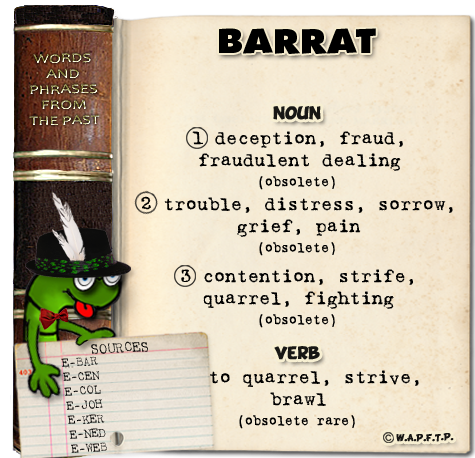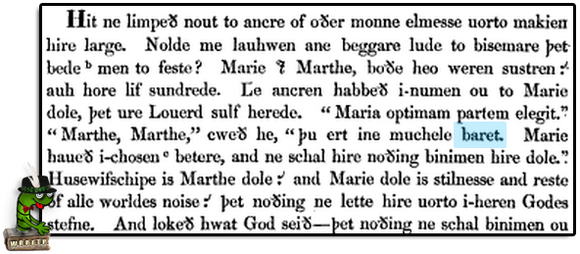|
From: E-NED from Old French barat (nom. baras) masc. (= It. baratto, Old Sp. barato, Pr. barat), also Old French barate fem. (= Old Sp., Cat., Pr. barata) ‘deceit, fraud, confusion, trouble, embarrassment.’ Of doubtful origin: the final -at of Old French, and Italian -atto, indicate an original a in position, as -att-, -apt- (Godef. has a 14th c. spelling barapt). The original sense in Romanic seems to have been ‘traffic, commerce, dealing’ (P. Meyer). Diez, Scheler, and E. Müller favour a possible derivation from Greek πράττειν ‘to practise, do business, deal,’ as to which see their works. Chevallet and Stokes compare OIr. mrath, later brath, Old Breton brat, later brad, Welsh brad ‘betrayal, treachery,’ as the possible source of the Fr. and thence of the other Romanic forms. Sense 3 cannot be separated from Old Norse barátta ‘fight, contest, strife, (in deriv.) trouble,’ which appears to have concurrently or independently influenced the English word. c 1230 (noun 2) - Ancren Riwle; see below From: The Ancren Riwle, A Treatise on the Rules and Duties of Monastic Life Edited and translated from a Semi-Saxon MS. of the Thirteenth Century By James Morton Printed for the Camden Society, 1853 P. 414 From: Chronicle of Scottish Poetry:
From the Thirteenth Century, to the Union of the Crowns, Edited by James Sibbald, Volume II, 1802 James V. 1513-1542 P, 137
0 Comments
Leave a Reply. |
Archives
September 2021
|





